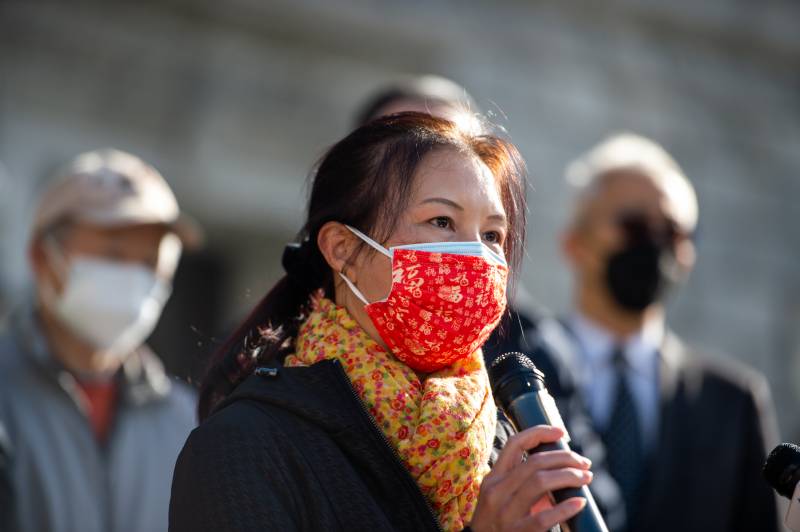Once you’ve filled out the form, you can present the form in person at the Department of Elections office in City Hall or mail it (via the U.S. Postal Service) to:
Department of Elections
City Hall
1 Dr. Carlton B. Goodlett Place, Room 48
San Francisco, CA 94102
The registration deadline is Jan. 31. If you miss it, don’t worry: You can still register, but you will no longer have the option to do so through the mail. You’ll have to fill out the form and submit it in person at City Hall or at your nearest polling booth.
Are noncitizen votes counted differently from those of citizens?
No, noncitizen votes are included in the overall tally of school board elections.
“For the most part, it’s the same election — noncitizens experience the same election as other voters,” said Arntz.
There are some slight differences in the way that elections are administered for noncitizens.
These voters are registered in a local database, separate from the statewide system that only contains the information of voters who are citizens. And noncitizens receive a unique voter guide, written in four languages (English, Spanish, Chinese and Tagalog) and a ballot containing only school board races.
Where is this information going to go? Will my information be shared with other government agencies like ICE?
Once you’ve filled out your voter registration form and sent it over to the Department of Elections, your information will be stored in this agency’s database. According to Arntz, the city keeps a separate database for the registration information shared by noncitizens.
“We can’t input noncitizens into the statewide database,” he said, but added that the noncitizen database must follow the same rules regarding who has access to its contents. Government agencies, political campaigns and journalists can all request to see specific information about registered voters, like addresses or demographic information.
Arntz acknowledges that this may worry some folks that federal agencies like U.S. Immigration and Customs Enforcement (ICE) could access the personal details of undocumented San Franciscans who registered to vote. However, he points out that there is a system in place that screens who can access this information.
“If someone requested specifically the registration information [of noncitizens] from us, we would actually consult the city attorney’s office first before we did anything,” he said. ICE could request this information, but Arntz says that he has never received a request from this agency since the city expanded voter eligibility in 2016.
Additionally, the city attorney’s office published a memo on Jan. 20, defending the legality of letting noncitizen parents vote in school board elections, stating that, “School Board elections are for a local purpose, distinct from an election for federal office … noncitizen voters cannot and do not vote in any other election contest.”
Will participating in this election affect my immigration application in the future?
KQED spoke with Tala Hartsough, a senior staff attorney with CARECEN SF, a San Francisco-based nonprofit providing immigration legal services and social services to Bay Area migrants, to understand whether voting in the school board recall election could complicate future prospects of becoming a U.S. citizen or legal permanent resident.
As part of their naturalization process, some folks have to submit an N-400 form to U.S. Citizenship and Immigration Services. This form asks whether the applicant has ever registered or voted in a federal, state or local election.
“In contrast, when someone is applying to become a permanent resident, the question is different on the form,” Hartsough said. The application for permanent residency, I-485, asks whether the applicant has ever voted in violation of any federal, state or local provision.
Hartsough understands that some people might feel nervous answering these questions if they’ve previously registered to vote as a noncitizen — because the federal government restricts voting to citizens.
“When [someone] is applying for citizenship, they need to show that they have good moral character,” Hartsough said. Immigration officials also can use good moral character as a metric to inform their decision in other types of immigration applications.
If you were to register for an election you are not allowed to participate in as a noncitizen (the presidential election, for example) by falsely claiming to be a citizen, Hartsough says, then that would be unlawful and could bar you from the good moral character requirement.
“But I don’t think that someone who meets the requirements of registering to vote [in San Francisco], registers, then votes in the school board election would be implicating any of those problems,” she said.
Hartsough explains that when a noncitizen parent votes in San Francisco, they’re not claiming to be a citizen or voting as a citizen. When someone fills out a noncitizen registration form, they are making it explicit that they will be participating in the school board election as a noncitizen, and will have access to a separate ballot that includes only questions about that election.
“[Eligible parents are] not going to say they’re a citizen, because they don’t need to be,” she added. “So someone is not registering unlawfully if they qualify.”
Additionally, the Department of Elections offers, upon request, a letter that confirms that certain noncitizens are eligible to vote in San Francisco school board elections.
However, Hartsough stresses that it’s important for someone going through an immigration process to notify their legal representative if they voted or are planning to vote in the school board election as a noncitizen. Talking about these things helps prepare an attorney and an applicant for any potential questions from immigration officials.
Each case is different and it’s best to consult with an immigration attorney to fully understand any potential effects in your proceeding that could come from voting. We’ve compiled below a list of nonprofit organizations in San Francisco that can connect you to immigration legal aid.

